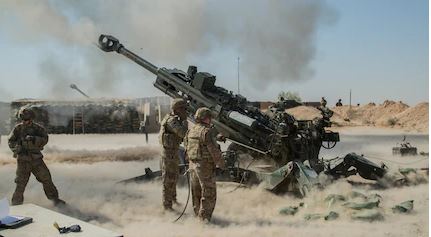
18 Years of War in Iraq: Will the Forever Wars End Soon?
18 Years of War in Iraq: Will the Forever Wars End Soon?
This week marks the 18th anniversary of one of America’s most controversial wars in generations: The Iraq War. On March 20, 2003, U.S. British, and Australian forces invaded the Middle Eastern nation of Iraq, which was then ruled by the bloody-handed dictator, Saddam Hussein.
A quick re-wind here, to go into the brief background of why we invaded Iraq in 2003, which set up one of America’s “Forever Wars.”
In October, 2002, the U.S. Congress passed the Authorization For Use of Military Force Against Iraq Resolution of 2002. This AUMF, (still in effect in 2021, by the way) which followed a similar AUMF in 2001 authorizing the Global War on Terrorism that sprang from the 9/11 terrorist attacks on America, and set in motion a war that we are still dealing with today. This was not America’s first war with Iraq. In 1990-1991, the U.S. fought Iraqi forces to liberate Kuwait from Saddam’s occupation army. After this successful conventional war, the U.S. and Britain maintained a No-Fly Zone over large swaths of Iraq, which developed into an aerial war of sorts against Saddam’s regime.
The George W. Bush Administration invaded Iraq for several reasons. The biggest public reasons involved Saddam’s alleged stock of Weapons of Mass Destruction, and some tenuous and factually-questionable ties to al-Qaida. Plus, Bush really hated Saddam, especially since Saddam tried to have the president’s father, the first President Bush, assassinated. As it turns out, no WMDs were ever uncovered, but the invasion was still a success in that Saddam was toppled, eventually captured, and put on trial by the new Iraqi government, which then executed him.
But, despite the relatively quick conquest of Baghdad, and the melting away of Saddam’s forces, two significant insurgencies developed. One, encouraged and to a large degree directed by Iran, was the Shiite insurgency, primarily in southern Iraq. The other Iraqi insurgency was among the Sunni religious minority, (Saddam’s faith), and it was this guerrilla war that actually drew in al-Qaida (a fanatical Sunni movement) and the Iraqi branch of al-Qaida eventually morphed into what we know variously as ISIS, ISIL, Da’esh, or more simply, the Islamic State.
By the end of 2011, the Obama Administration drew down U.S. military involvement to the point where the original Iraq War, begun on March 20, 2003, ended. However, the weak Iraqi government that was left behind was unable to defend itself, and, in neighboring Syria, itself riven with a multi-sided civil war, the Islamic State grew more powerful, and launched an invasion of Iraq in 2014.
In response to this attack, and the massacres of Iraqi Kurds, Christians, and Yazidis, the United States again went to war in Iraq, this time defending an Iraqi government, in coalition with the British, French, and others. American forces are still in Iraq (and Syria) battling against ISIS.
Thus far, from 2003 to today, in March of 2021, nearly 4,600 American troops have died fighting in Iraq, with many thousands more wounded, many with injuries that impact the quality of life for themselves and for their families. Interestingly, representatives in the U.S. Congress plan on introducing legislation that will end then 2003 AUMF, nearly 18 years after it was first approved, setting America on course for nearly two decades of war in Iraq.

